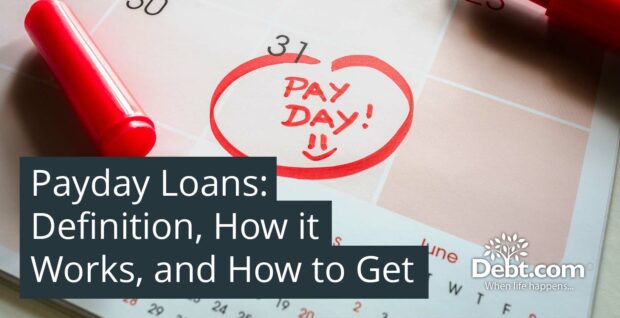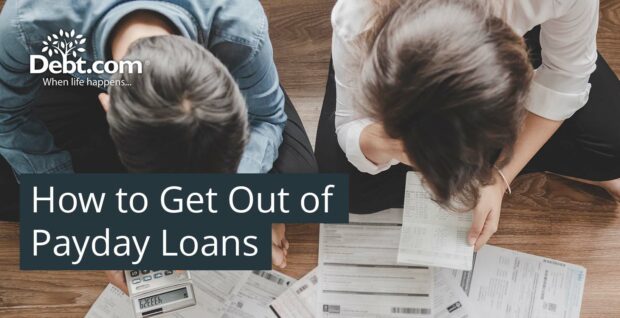
Payday loan consolidation involves obtaining a new loan, often called a debt consolidation loan, to pay off multiple existing high-interest payday loans. Payday loans are short-term, high-interest loans typically used by individuals needing quick cash before their next paycheck. The new consolidation loan generally has a lower interest rate and a more extended repayment period than the original payday loans. The process alleviates the burden of high-interest debt and helps break the cycle of payday loan dependency, similar to credit consolidation, where various debts are combined into a single, more manageable payment.
Payday loan consolidation works by providing the borrower with a personal loan from a bank, credit union, or other lender. The borrower uses the funds from the personal loan to pay off their outstanding payday loans. The interest rates on payday loans are usually 400% or higher, while personal loans typically range from 6% to 36%. The personal loan is repaid over an extended period, typically between 12 and 84 months, with fixed monthly payments. The method offers much lower interest rates and costs, making the debt more manageable and affordable for the borrower. The longer repayment period further reduces the financial burden, enabling more reasonable monthly installments. Consolidating payday loans improves the borrower’s credit score, provided payments are made on time.
Calculate the total outstanding balance of all payday loans, including principal, interest, and fees, to achieve payday loan debt consolidation. It helps plan the consolidation loan and negotiate with lenders. Review the credit report to understand the credit health and find suitable lenders. It directly affects the terms, interest rates, and consolidation loan approval. Compare options from various lenders, including credit unions, online lenders, and banks, ensuring a manageable monthly payment and better repayment terms. Pre-qualifying for the loan allows borrowers to compare loan offers without damaging their credit score, ensuring they find the best deal and save time.
Fill out an online application with the details and documentation after choosing a lender. Funds are typically transferred within one week of approval. Use these funds to pay off each payday lender and repay the personal loan. Ensure timely payments to avoid late fees and protect the credit score. Debt consolidation for payday loans provides a path to financial stability by breaking the cycle of high-interest debt and moving toward payday loan debt relief. Borrowers improve their financial prospects by following these steps.
Table of Contents
What is a Payday Loan Consolidation?
Payday loan consolidation involves obtaining a new loan, often called a debt consolidation loan, to pay off multiple existing high-interest payday loans. The new loan generally has a lower interest rate and a more extended repayment period than the original payday loans. Payday loan consolidation alleviates the burden of high-interest debt and breaks the cycle of payday loan dependency. The method is similar to credit consolidation, where various debts are combined into a single, more manageable payment.
How does Payday Loan Consolidation Work?
Payday loan consolidation works by providing the consumer with a personal loan from a bank, credit union, or other lender. The borrowers pay off their outstanding payday loans with money from personal loans. Payday loans frequently have interest rates of 400% or higher; in contrast, personal loans usually have significantly lower interest rates, often ranging from 6% to 36%. The personal loan is repaid over an extended period, typically between 12 and 84 months, with fixed monthly payments.
The primary advantage of debt consolidation for payday loans is that it offers much lower interest rates and costs than payday loans. It makes the debt more manageable and affordable to the borrower. The longer repayment period further lessens the borrower’s financial burden, enabling more reasonable monthly installments.
Consolidating payday loans boost the borrower’s credit score, provided payments are completed on time. There are no rollovers or additional costs once the combined loan is paid off, which makes the way to debt freedom more transparent than with payday loans. Borrowers who choose to consolidate payday loans break the cycle of high-interest debt and move toward financial stability.
When should You Consider Consolidating Payday Loans?
You should consider consolidating payday loans when the high interest rates, which reach an average APR of 400%, become unaffordable. Consolidation manages debt at a cheaper cost because payday loans are known for having high interest rates.
Consolidation helps borrowers achieve a more uncomplicated repayment arrangement. Payday Loans are challenging to track due to their various due dates and payback periods. Consolidation simplifies the procedure by offering a single, understandable payback plan.
Consolidation is an option when turning over or extending payday loans becomes impossible. Prevent the necessity of further extending the loans by obtaining a new loan to cover the total balance.
Consolidation gives borrowers control over repayment if payday lenders automatically debit their accounts. It allows borrowers to manage their budgets better and avoid unexpected deductions.
What is the Difference Between Payday Loan Consolidation and Payday Loan Debt Settlement?
The difference between payday loan consolidation and payday loan debt settlement lies primarily in their processes, impact on credit scores, eligibility criteria, and costs.
Debt consolidation pays off several outstanding payday loans by taking out a new personal loan with a longer repayment period and a reduced interest rate. The procedure includes calculating the total amount owed on payday loans, evaluating credit for advantageous conditions on a consolidation loan, comparing offers from different lenders, and paying off the payday loans with the consolidation loan. The new loan is repaid through automatic payments, streamlining repayment on a scheduled basis.
Payday loan debt settlement involves negotiating with lenders to settle the debt for a lesser amount than the original obligation. It often involves a third-party service as an intermediary, facilitating negotiations where lenders agree to accept a reduced settlement amount, typically around 50% of the original debt. The borrower then makes a single payment of the negotiated settlement amount, and the lender marks the account as “paid as settled” on the credit report.
Payday loan consolidation initially resulted in a slight decline in credit scores due to the hard credit check during the application. Credit scores gradually improve with timely payments on the new consolidation loan. Payday loan debt settlement typically has a greater detrimental effect on credit ratings due to missed payments and increased debt balances (including fees and interest accrued before settlement), often resulting in closed accounts marked as settled on credit reports.
Eligibility requirements for payday loan consolidation often require a respectable credit history, though some lenders work with applicants with poor credit, possibly requiring a cosigner for better approval odds. Payday loan debt settlement has fewer stringent eligibility standards as it involves negotiating with lenders for less than the full amount owed.
Payday loans often carry 400% or higher APRs, while consolidation loans generally have 6% and 36%. Debt settlement reduces the total amount owed but involves additional costs for legal representation or third-party negotiators, making it less cost-effective than consolidation.
Understanding these differences is crucial when deciding between Debt Consolidation vs Debt Settlement for managing payday loan debt, as each method has significant implications for financial stability and credit health.
What are the Advantages of Payday Loan Consolidation?
The advantages of payday loan consolidation are listed below.
- Lower fees: Consolidating payday loans into a single personal loan saves a significant amount of money due to lower interest rates than payday loans.
- Longer repayment terms: Payday loans typically require repayment within a short period, often two weeks, whereas consolidated loans offer longer repayment periods of up to 60 months. The extended timeframe increases the likelihood of successfully paying off the loan.
- Predictable monthly payments: Consolidated loans provide borrowers with predictable monthly payments. The predictability contrasts with the fluctuating repayment terms of payday loans.
- Improved credit: Making timely payments on a consolidated loan improves credit scores, particularly if they have been negatively affected by payday loans.
- No rollovers: Consolidated loans do not involve rollovers, which are common with payday loans and lead to a cycle of debt accumulation. The structure helps borrowers avoid falling deeper into financial difficulties.
What are the Disadvantages of Payday Loan Consolidation?
The disadvantages of payday loan consolidation are listed below.
- Eligibility challenges: A low-interest personal loan for consolidation is not available if past payday loans have damaged the borrower’s credit history. The interest rates remain high in such cases, making consolidation less financially advantageous.
- Temporary solution: Payday loan consolidation addresses short-term debt but does not resolve long-term issues like high-interest credit cards or personal loan debt. A lack of comprehensive debt management strategies causes persistent financial concerns.
- Longer repayment periods: Extending the repayment period of a consolidated loan, which lasts up to 60 months, reduces monthly payments but increases interest costs over the loan term, raising the total borrowing expense.
- Collateral risk: Some consolidated loans require collateral, such as a home or car, especially if the borrower’s credit history is problematic. The risk of losing these assets if the borrower defaults on the loan adds significant financial risk to the consolidation process.
What Types of Loans can be Used to Consolidate Payday Loans?
The types of loans that can be used to consolidate payday loans are listed below.
- Personal Loans: Personal loans are unsecured loans from banks or credit unions that provide a lump sum payment for various goals. Consolidating payday loans with personal loans helps improve credit scores and simplifies money management. The consolidation enhances credit scores by reducing credit utilization ratios and diversifying credit types. It facilitates financial management by consolidating multiple debts into one.
- Credit Card Balance Transfers: Credit card balance transfers involve transferring existing debt to a new card with a lower interest rate and an introductory 0% APR period. It helps consolidate payday loan debts and save on interest. Debtors must know balance transfer fees and interest rates after the introductory period ends.
- Home Equity Loans: Home equity loans are secured loans that consolidate debt using the homeowner’s equity as collateral. They offer interest rates slightly above average mortgage rates, which are lower than credit card interest rates. Home equity loans consolidate payday loans, allowing borrowing against the home’s equity. The amount borrowed is based on the difference between the home’s market value and mortgage balance.
How to Consolidate Payday Loans?
To consolidate payday loans, follow the six steps listed below.
- Get the total of payday loan balances. Understand the total outstanding balance, which includes principal, interest, and fees. It aids the debtor in understanding the financial situation, planning consolidation loans, and negotiating with lenders. The total balance helps determine the new loan’s terms, such as interest rate and repayment period.
- Check credit. Checking a person’s credit provides insight into the debtor’s credit health. It helps borrowers find suitable lenders and directly affects the terms, interest rates, and approval of the consolidation loan, offering debt consolidation loans for bad credit if needed.
- Shop around for the best loan. Debtors must find the best loan for debt consolidation, shop around, and compare options from various lenders, including credit unions, online lenders, and banks. It allows for comparing terms and interest rates, prequalification without affecting credit, and replacing multiple high-interest payday loans with a single lower-interest loan. Shopping around for the best loan ensures a manageable monthly payment and better repayment terms.
- Pre-qualify for a payday loan. Pre-qualifying allows debtors to compare loan offers without damaging a person’s credit score. It helps borrowers find the best deal, ensures approval before application, and saves time by avoiding unnecessary credit report inquiries.
- Apply for the loan and receive funds. Applying for a personal loan involves filling out an online application with personal information and documentation. Funds are transferred to the borrower within one week of approval.
- Settle debts with lenders and start repaying personal loans. Borrowers must pay off individual debts from each payday lender and plan to repay the personal loan. Missed payments result in late fees and jeopardize credit scores. The step finalizes the process, stops the high costs and interest cycle, and begins a manageable repayment plan.
What should You Consider before Getting a Payday Loan Consolidation?
The things that you should consider before getting a payday loan consolidation are listed below.
- Interest Rate: The interest rate on the loan must be less than the interest rate of the debtor’s current payday loans. It cuts monthly expenses and costs by a notable amount, making the loan easier to handle and saving money.
- Fees: Payday loan consolidation comes with upfront costs, processing charges, and prepayment penalties. The fees offset future savings, but consolidating into a single personal loan leads to lower interest rates and longer repayment periods.
- Loan Term: The debtor must understand the loan terms, including interest rate, repayment period, monthly payment amount, and any fees or penalties. A longer loan term makes payments affordable and manageable, offering more time to repay the loan. It allows for a fixed payment schedule, avoiding the need to generate a large sum in a short span.
- Monthly Payment: The debtor’s consolidation loan must be within the borrower’s budget to prevent a debt cycle. Payday loan consolidation with fixed monthly payments and lower interest rates makes the loan affordable and predictable, improving the debtor’s credit score and budgeting. The debtor must avoid overcommitting to payments that strain finances and consider the benefits of timely payments.
- Impact on Credit Score: Applying for a new loan temporarily lowers a person’s credit score due to a hard inquiry on the credit report. A consolidation loan helps the credit score over time by making payments manageable and lowering the credit utilization ratio. Managing the consolidation loan well with timely payments helps improve credit score, although the initial credit check caused a slight drop.
- Lender Reputation: Research the lender’s reputation and credibility to ensure a fair deal and quality service. Debtors must be cautious of lenders who guarantee approval or charge fees before the loan is approved. Borrowers must examine online reviews, ratings, and accreditations to verify trustworthiness. A reputable lender offers better terms, customer service, and a trustworthy borrowing experience.
What is the Eligibility Criteria for a Payday Loan Consolidation?
The eligibility criteria for a payday loan consolidation are listed below.
- Minimum Debt Threshold: The minimum debt threshold is a financial eligibility standard for payday loan consolidation. It ensures the process is financially viable for the lender and borrower. It confirms that the total debt amount is substantial enough to warrant consolidation, which benefits the borrower with lower interest rates and simplified payments.
- Stable Income: Stable income is needed for borrowers to meet the repayment requirements of consolidated payday loans. It is a consistent and reliable source of income that covers monthly payments with lower interest rates over a longer period. The financial capacity of having a stable income indicates a lower risk for lenders.
- Legal Identification and Address Proof: Online lenders require legal identification and proof of address to verify a borrower’s identity and residence. Legal identification includes official documents such as ID cards or passports, while address proof confirms the borrower’s residence. The documents help prevent fraud and ensure lenders have contact with the borrower regarding the loan.
- Eligible Payday Loans: Eligible payday loans for consolidation meet specific criteria set by the lender offering the service. It includes the original lenders, terms of the loans, and outstanding balances. The goal is to combine multiple loans into one with lower interest rates and manageable monthly payments.
- Debt-to-Income Ratio: Lenders use the Debt-to-Income Ratio (DTI), a financial metric that compares monthly debt payments to gross income, to assess a borrower’s financial management and repayment capacity. It assesses a borrower’s ability to manage monthly payments and repay debts. A lower DTI indicates more disposable income, which is preferable for lenders.
- Status of Residence: Residency status is needed on payday loan consolidation, as lenders require proof of legal residency to comply with local laws and financial regulations. Documentation, including a driver’s license, state ID, or passport, is required as part of the lender’s due diligence process.
- Age Requirement: A legal age of 18 or older is required for payday loan consolidation, which involves combining multiple debts into one personal loan for less cost and easier management.
What should You Look for in a Payday Loan Consolidation Company?
You should look for a payday loan consolidation company with an excellent reputation for transparency, good customer service, and support. A debtor must ensure recognized organizations accredit the company with positive customer reviews. A reputable payday loan consolidation company has a strong reputation, indicating reliability and effectiveness. It has earned clients’ trust through consistent, ethical practices and successful consolidation outcomes.
A reputable company adheres to industry regulations and ethical standards, providing effective services that comply with legal requirements. An excellent reputation signifies a company’s history of putting clients’ interests first, providing quality services, and maintaining high standards of professionalism. Choosing a reputable company minimizes the risk of encountering hidden fees, fraudulent practices, or ineffective solutions.
Transparency is key in choosing a payday loan consolidation company and influences trust and service confidence. Transparent payday loan consolidation companies provide clear information about the programs, terms, fees, and risks, allowing customers to make informed decisions about their financial situation. Transparency signifies honesty and integrity, demonstrating a commitment to helping clients achieve economic stability.
A company with solid customer service provides personalized advice, clear communication, and a commitment to helping a debtor achieve financial freedom. A payday loan consolidation company must offer resources and tools to help manage finances better, such as educational materials, budgeting tools, and access to financial counselors. For example, Debt.com provides various debt relief solutions, personalized financial plans, and assistance from experienced specialists. Debt.com connects debtors with certified debt specialists, offers educational content, and collaborates with accredited partners for outstanding customer service.
Is Comparing Consolidation Lenders for Payday Loans Important?
Yes, comparing consolidation lenders for payday loans is important. It helps borrowers find the most favorable terms, such as lower interest rates and extended repayment terms. Comparing consolidation lenders for payday loans reduces the financial burden and provides a clearer path toward debt repayment.
Consolidating multiple high-interest loans into one with a lower interest rate makes monthly payments manageable and helps debtors stick to a debt payoff plan. Different lenders offer varying interest rates, fee structures, and repayment plans, which affect the total cost of the loan and repayment ability. Evaluating multiple lenders helps borrowers identify the one that offers the best terms, saving money over time. Comparing lenders helps avoid predatory practices and choose a reputable company with transparent policies and strong customer support.
What is the Average interest Rates for Payday Loan Consolidation?
The average interest rate for payday loan consolidation ranges from 6% to 36%. Payday loan consolidation involves taking out a new loan with a lower interest rate to pay off multiple loans. Borrowers with higher credit scores qualify for rates at the lower end of the range, while borrowers with lower credit scores face rates closer to 36%.
Payday loan consolidation has a fixed interest rate and term, ensuring consistent payments throughout the loan. Benefits of consolidating payday loans include reduced interest rates, an extended repayment term, lower fees, and lower interest payments. The wide range of the average interest rate reflects the risk lenders perceive when lending to borrowers with varying credit histories.
Understanding average interest rates for payday loan consolidation helps with budgeting, comparison, negotiation, and financial planning. It helps with monthly payments and interest costs, enables comparison of loan offers, negotiates better terms with lenders, and understands savings from consolidating high-interest payday loans into lower-interest options. The knowledge aids in making smarter financial decisions and saving money.
How does Debt Consolidation Affect Your Credit Score?
Debt consolidation affects your credit score by causing a slight dip due to a hard credit inquiry. It improves by simplifying payments and reducing debt. It is a procedure that involves consolidating existing debts into one with favorable terms, such as lower interest rates.
Debt consolidation improves a debtor’s credit score by building a history of on-time payments, reducing the credit utilization ratio, and diversifying the credit mix. Building a history of responsible repayment behavior is achievable by taking out a loan to pay off debts and completing the payments on time. Successfully paying off debts lowers the credit utilization ratio, which accounts for 30% of a person’s credit score. Debt consolidation helps diversify the credit mix, as juggling different types of credit products helps grow a debtor’s score.
Debt consolidation involves taking out a new loan or credit card to pay off existing debt, temporarily reducing a borrower’s credit score. The process requires a hard credit check during the application process, negatively impacting a person’s credit score. Examples of how paying off debt hurts a person’s credit score include triggering a hard credit inquiry, closing out credit cards, and late payments. Consolidating debt removes certain lines of credit from a person’s credit mix, which affects the credit rating.
What are Alternative Solutions to Payday Loan Consolidation?
The alternative solutions to payday loan consolidation are listed below.
- Borrowing from Friends and Family: Borrow from friends and family to evade the high interest rates and fees of payday loans. Create a loan agreement with repayment terms and interest rates, and repay on time to maintain a healthy relationship. Treat loans seriously and draft a formal contract.
- Credit Counseling: Credit counseling is a service nonprofit agencies offer to help individuals manage their debts through financial education and budgeting. It provides personalized solutions, such as negotiating with lenders to lower interest rates or create a manageable repayment plan.
- Payday Alternative Loans (PALs): Payday alternative loans (PALs) are lower-cost alternatives to traditional payday loans. Payday Alternative Loans are affordable and manageable, offering up to $2,000 to avoid or pay off high-interest loans. The maximum interest rate is 28%, and repayment takes up to six months.
- Debt Settlement: Debt settlement is a negotiation process in which the debtor pays less than the debt amount through a debt settlement company. It reduces the overall debt but negatively impacts the credit score.











